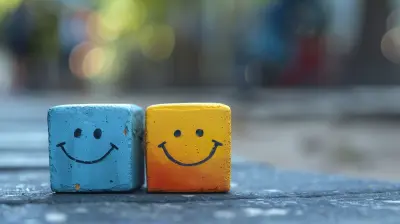How Empathy Can Help You Become a Better Listener
30 July 2025
Ever had a conversation where you felt like the other person just didn’t get you? Like you were talking, but not really being heard? Yeah, we’ve all been there. Turns out, the missing piece in those moments is often a little thing called empathy.
Empathy isn’t just about feeling sorry for someone or nodding your head at the right times. It’s about emotionally tuning into someone else’s experience, seeing things from their perspective, and responding with genuine understanding. And here’s the kicker: when you bring empathy into your conversations, you automatically become a better listener.
In this article, we’re going to talk about how empathy not only deepens your relationships but upgrades your listening skills like nothing else. Whether you're talking with a friend, coworker, partner, or even a stranger, empathy can be your secret weapon for more meaningful and effective communication.
What Is Empathy, Really?
Let’s not get tangled in textbook definitions. At its core, empathy means putting yourself in someone else’s shoes—feeling with them, not just for them. You’re not just seeing their pain, joy, stress, or confusion; you’re allowing yourself to emotionally relate to it.It comes in a few flavors:
- Cognitive empathy: understanding what someone’s going through.
- Emotional empathy: actually feeling it with them.
- Compassionate empathy: wanting to help them as a result.
Empathy doesn’t mean you have to agree or fix things—it means you’re present. You’re real. And that's incredibly powerful when it comes to listening.
Why Good Listening Is Harder Than It Sounds
We think we’re good listeners... until we realize we’re not.Most of us listen to reply, not to understand. Ever found yourself rehearsing what you’re going to say while the other person is still talking? Yep. Guilty as charged.
We’re distracted, rushed, or just not present. Social media has made 8-second attention spans a norm. But real listening? That takes patience. Being truly present is rare, which is why empathetic listeners stand out so much.
Here’s Where Empathy Steps In
Empathy is the thing that slows you down. It says, “Wait. Let me feel what they’re feeling first.”Think of it like your internal "pause" button. Instead of jumping to conclusions, giving unsolicited advice, or hijacking the conversation with your own story, empathy forces you to be there—fully.
The result? People feel heard. Not just listened to, but really heard. And that kind of listening leaves a lasting impact.
Benefits of Empathetic Listening
Let’s unpack what makes empathetic listening so powerful:1. Builds Deeper Connections
When someone feels understood, it builds trust. Relationships—personal or professional—aren't built on words alone. They're built on connections. And empathy is the glue.2. Reduces Misunderstandings
Ever had a conversation spiral because you misread the tone or intent? Empathy helps cut through misinterpretations. You’re not just hearing words; you’re tuning into feelings and intentions.3. Calms Emotional Storms
When someone’s upset, advice isn’t what they need—it's understanding. Empathetic listening helps de-escalate emotional situations. It tells the other person, “I’m here. You’re not alone in this.”4. Encourages Genuine Sharing
When people feel safe and understood, they open up more. That means deeper, more honest conversations happen naturally.How to Practice Empathetic Listening (Without Feeling Awkward)
Okay, so empathy sounds great—but how do you actually do it in a conversation?1. Be Fully Present
Put the phone down. Close the laptop. Make eye contact. Let your body language say, “You have my full attention.” Even just nodding or leaning slightly forward can show you're engaged.2. Listen to Understand, Not to Respond
This one’s a game-changer. Instead of planning your reply, focus on what the person is really trying to tell you. What emotions are underneath their words? What's their body language saying?3. Validate Their Feelings
You don’t have to agree with them, but acknowledging their emotions shows you care.Try phrases like:
- “That sounds really tough.”
- “I can see why you’d feel that way.”
- “Wow, that must’ve been frustrating.”
Simple, but incredibly validating.
4. Ask Open-Ended Questions
Instead of “Are you okay?” go with “What’s been on your mind lately?”Instead of “Did that bother you?” ask “How did that make you feel?”
Open-ended questions invite more than a yes or no—they open the door to real insight.
5. Mirror What You Hear
Sometimes repeating the gist of what someone says helps them feel understood.Example:
Them: “I’ve just been feeling overwhelmed with everything at work.”
You: “Sounds like things have been a lot to handle lately.”
It’s not about parroting—it’s about reflecting and checking in.
6. Keep Judgment in Check
This might be the hardest part. We all have internal biases and opinions. But empathetic listening means pressing pause on judgment and just being there.Ask yourself: “Am I judging this person, or am I trying to understand them deeply?” That mental shift can change everything.
Empathy in Everyday Life
You don’t need to be a therapist to practice empathetic listening. It works everywhere:- At home: Your partner vents about their day. Instead of offering a fix, you say, “That sounds exhausting. Want to talk more about it?”
- At work: A colleague seems off. You check in with a simple, “Hey, I noticed you’ve been quiet lately. Everything okay?”
- With friends: Someone's going through a breakup. Instead of “You’ll move on,” try, “Heartbreak really sucks. I’m here if you need to talk.”
Each of these small moments builds trust, connection, and emotional safety.
How Empathy Changes You, Too
Here’s something people don’t talk about enough: empathy doesn’t just help others—it transforms you.Empathetic listening rewires your brain. It boosts your emotional intelligence, deepens your patience, and sharpens your intuition. You become more aware of subtle cues—tones, pauses, body language—all of which make you a better communicator overall.
It also makes you more grounded. When you practice empathy, you become less reactive, less judgmental, and more compassionate—not just toward others, but yourself too.
Common Roadblocks to Empathetic Listening
Let’s be real. Being empathetic isn't always easy. Some things get in the way:1. Distractions
We live in a noise-heavy world. Texts, notifications, emails—it’s hard to stay present. Empathy needs your full focus. Try to cultivate quiet spaces, even just for a few moments.2. Internal Biases
Sometimes we subconsciously judge someone’s feelings. We might think they’re overreacting or being too sensitive. Catch those thoughts and replace them with curiosity instead.3. Emotional Burnout
If you’re emotionally drained, it’s harder to offer empathy. Self-care matters here. You can’t pour from an empty cup.Final Thoughts: It All Starts With Presence
Being a good listener isn’t about having the right answers. It’s about being present. When empathy is in the mix, your conversations become richer, your relationships grow stronger, and you create space for real human connection.So next time someone opens up to you—pause. Tune in. Feel with them. That’s how empathy transforms your listening from passive hearing to powerful connection.
Because sometimes, the best thing you can say isn’t much at all—it’s “I’m listening.
all images in this post were generated using AI tools
Category:
EmpathyAuthor:

Alexandra Butler
Discussion
rate this article
2 comments
Katalina Snyder
This article offers valuable insights into the transformative power of empathy in enhancing listening skills. It’s a gentle reminder that truly understanding others requires more than just hearing their words; it demands an open heart and a willingness to connect on a deeper level.
December 11, 2025 at 6:02 AM

Alexandra Butler
Thank you for your thoughtful comment! I'm glad you found the insights on empathy and listening valuable. It truly makes a difference in our connections.
Patricia McBride
This article beautifully illustrates how cultivating empathy not only enhances our listening skills but also fosters deeper connections. Understanding others' emotions enriches communication, paving the way for meaningful relationships.
August 4, 2025 at 2:50 PM

Alexandra Butler
Thank you for your thoughtful comment! I'm glad you found the connection between empathy and effective listening so impactful.


